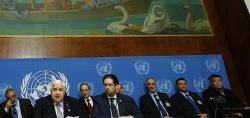The first round of peace talks aimed at ending the war in Syria has ended without any significant breakthrough as rival sides blamed each other for lack of progress.
United Nations Arab League envoy to Syria, Lakhdar Brahimi, said on Friday that while talks between Syria's regime and opposition had made slim progress, they had raised hopes for a solution to the country's war.
Brahimi said he saw some positive steps and common ground, but that the gaps between the sides remained wide.
Brahimi said that the opposition delegation would be back on February 10, but President Bashar al-Assad's delegates had told him they would have to check with Damascus before agreeing to return.
He listed 10 simple points that he felt the two sides agreed on in the talks and said he thought there was more common ground than the sides recognized.
But neither side has budged an inch from their main positions: the opposition wants the talks to focus on a transitional administration it says will remove Assad from power. But the regime wants to talk about fighting "terrorism" - a word it uses to refer to all armed opposition groups.
The sides also failed to achieve more modest aims, such as an agreement to allow aid convoys into Homs, Syria's third largest city, where thousands of civilians are trapped with no access to food or medicine.
Syria's opposition spokesman, Louay Safi, told Al Jazeera: "There is no way there could be progress without establishing a governing transitional body with authority to deal with political and military matters."
Expectations had been low for a breakthrough on political issues at the talks, the first between Assad's representatives and opposition groups in an almost three-year-old crackdown that has killed 130,000 Syrians and driven a third of the population from their homes.
"Progress is very slow indeed, but the sides have engaged in an acceptable manner," Brahimi said. "This is a very modest beginning, but it is a beginning on which we can build."
Syrian opposition chief Ahmad Jarba accused the regime of showing no "serious engagement" during the week-long talks.
"We cannot talk about serious engagement from Assad's representatives," Jarba told reporters after end of negotiations.
Al Jazeera's Zeina Khodr, reporting from Geneva, said: "A main point of contention has also been the role of President Bashar al-Assad. We did not hear Brahimi mention his name, nor did Louay Safi touch upon that."
"This peace track will continue because this is what the international community wants. There is no alternative other than war."
Complicating matters further, the US and Russia clashed over the pace of Syria's handover of chemical arms for destruction with Washington accusing Damascus of foot-dragging, but Moscow - President Assad's big power ally - rejected this.
US Secretary of State John Kerry said Syrian authorities had no excuse for delays in shipping its poison gas arsenal abroad under a deal reached last year. Moscow said Assad was acting "in good faith" and a June 30 deadline for eliminating the chemical agents remains viable.
PHOTO CAPTION
Syria's Foreign Minister Walid al-Moualem (C) addresses a news conference at the United Nations European headquarters in
Geneva January 31, 2014.
Al-Jazeera


 Home
Home Discover Islam
Discover Islam Quran Recitations
Quran Recitations Lectures
Lectures
 Fatwa
Fatwa Articles
Articles Fiqh
Fiqh E-Books
E-Books Boys & Girls
Boys & Girls  Ramadan
Ramadan Fatwa Audios
Fatwa Audios Month of Mercy
Month of Mercy Women
Women Eed Al- Fitr
Eed Al- Fitr Food Recipes
Food Recipes Videos
Videos

 Prayer Times
Prayer Times












